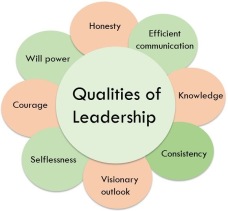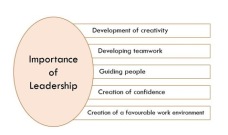A few important points about leadership
Definition: Leadership is an individual’s competence to influence their teammates, i.e., it is the ability to frame effective plans and influence others to deal with all the difficulties efficiently with proper guidance. It requires a clear vision of the desired goals and an ability to explore the various paths.
An individual who leads a position in a leadership process is known as “leader” who determines and directs the task-related actions of group members as it is unattainable to detach the process of leadership from the actions of the number of individuals collectively.
Content: Leadership
1. Qualities
2. Leadership skills
3. Importance
4. Conclusion
Qualities of Leadership
Following are the qualities of good leadership:
1. Selflessness:
The base and the heart of leadership quality is selflessness. The leader should set his objectives without being selfish and self-centric. The other two elements that a leader should have along with selflessness is are character and knowledge. Leaders, by the energy of their character, get the job done by managing people suitably. And on the ground of their knowledge, decides what to do in any circumstances. Sheer character not assisted by knowledge puts a ceiling in a leader’s capability.
2. Courage: The most astonishing human quality that a leader must retain is the courage to face the situations and take responsibility for success and failure of the decision taken by him or by his/her team members. A good leader is the one who has the courage to take responsibility for failure but gives credit to his/her team when succeeds.
3. Will power: Will power is a quality which is uniformly required in all prominent leaders. Thousands of difficulties emerge, and failures took place while executing plans. A good leader should have strong willpower to face hurdles instead of getting disappointed with failures while implementing the plans. The strong will power of a leader boosts his/her teammates will power and encourages them to give their best
4. Efficient communication: Good communication is the key to become an admirable leader. The logic behind it is clear if the leader carries all types of leadership qualities, yet if he fails to communicate properly, he will never be an admirable leader.
5. Knowledge: Leaders learn by way of their exertions which build up their knowledge. They intensify their experience by working in the department of work which can’t be interchanged by any device. A leader is also enforced to have a knowledge of handling people; although, appropriate knowledge of job also strengthens the confidence level of the leaders.
6. Honesty and Integrity: Honesty and integrity are the priceless assets of a leader and treated as the most commendable attribute of a leader. The leader should be honest with both his employees and the management of the organization. A leader should always keep their integrity above all else as once it ruins; it gets lost forever.
7. Consistency: Leadership effectiveness without consistency is illogical. The path of every leader is rare to oneself. Consistency helps in attaining a leadership position; however, it is not the only approach for effective leadership; it works along with other aspects of good leadership quality. A good leader can correct the rough spots but never let their team confuse by displaying inconsistency in his/her decisions.
8. Visionary outlook: It is one of the unique traits of the leader. They must be competent to look further where the company is standing today, recognize where the business is moving, and use that perspective to run the company ahead.
Leadership skills
To be a successful and lovable leader, the one should possess some extraordinary skills which make them distinct from others. Few imperative skills that every leader should have are as follows:
1. Taking responsibility and initiatives: Good leaders are always ready to take responsibility and have plenty of initiatives, i.e., they are always eager to do something new and different for the betterment of the organization.
2. Motivate and inspire: Efficient Leadership builds motivation by inspiring and encouraging their team member’s work as magnificent motivation expands productivity and delivers the strength to the enterprise.
3. Understand and empathize: It’s human physiology if one gets an appreciation, they perform with more enthusiasm, and a good leader should always keep this in mind that his followers are the one who leads him to the path of success. Thus, appreciating them and understanding their aspects becomes the moral responsibility of the leader.
4. Lead by example: Numerous outstanding leaders become an example for the new leaders. They should lead their followers by giving examples of extraordinary achievements they can get by following their path. Leadership is an art of managing the groups or teams in a synchronized manner so that the leader and employees both get benefited.
5. Think Strategically, flexibly and creatively: An energetic leader must anticipate such strategies that are creative and flexible and always ready to adopt the suggestions of his followers. It will increase the confidence of the employees and enhances their creativity and encourages them to achieve their targets.
6. Give appropriate and constructive feedback: In a leadership trail, the leader may face diversified complications and various unfavourable circumstances, yet his teammates are the one who confronts such situations along with them and together explores the solution. Thus, it’s the liability of the leader to give appropriate and constructive feedback of their team member’s work.
Importance of Leadership
Enterprises have accomplished remarkable success with the help of magnificent leaders. For displaying the importance of such leadership, the following points are summed up below:
1. Development of creativity: It flourishes creative followers in the enterprise. Innovative staff members bring success and develop the goodwill of the enterprise.
2. Guiding people: A leader must guide, advise and manage the groups. He performs the role of friend, guide and philosopher of his supporters and takes a start in all activities. A leader offers advice and direction and uses his ability in the preferred interests of the organization.
3. Developing teamwork: The continuous functioning of the enterprise count on the team spirit. Leaders impart a sense of socialism in the staff and oblige them to work as a team. For strengthening the team spirit, leaders are obligated to harmonize diverse interests and diversified goals to restore stability.
4. Creation of confidence: Leadership generates confidence in a team member by way of direction and honest advice. Good leadership impress followers and can acquire high performance from them. It accomplishes the enterprise’s purpose and the followers by building steady confidence and obtaining their follower’s loyalty.
5. Creation of a favourable work environment: A good leadership constitutes an encouraging favourable work environment in the enterprise so that their team members will be able to work evenly, efficiently and without any conflict.
Conclusion
Leadership is a trait that empowers the manager to adept a positive impact over his subordinate’s conduct. A leader is a dignitary who approaches organizational aims by manipulating the mindset and behaviour of others.


